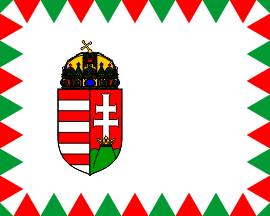 4:5
4:5image by Željko Heimer, 15 Sepember 2014

Last modified: 2015-02-01 by zoltán horváth
Keywords: hungary | honved | military flags |
Links: FOTW homepage |
search |
disclaimer and copyright |
write us |
mirrors
See also:
HONVÉD means soldier this is patriotic word. The word
"katona" = soldier is neutral. The word
"honvéd" = soldier means "the soldier who save
our country". HON = homeland VÉD = save. The new Hungarian
Army in 1848 was the Magyar Honvédség. The name of the
Hungarian army: between 1867-1949 Magyar Honvédség, 1949-1989
Magyar Néphadsereg (Hungarian People's Army), 1989-now Magyar
Honvédség.
The Budapesti Honvéd was the football-club of the army
1949-1989. Now the name of the FC. is Kispest-Honvéd FC
Istvan Molnar, 25 November 2000
"VÉD" actually means to guard. So, the term
more correctly means "Home Guard".
Georges Kovari, 27 November 2000
Marco Pribilla told me that the text of the law of
year 2000 changes regulations regarding the naval ensign -
instead of the flamullets used along the edges in 1995 law the
2000 text has triangles. The military unit flags (i.e. what would
be called colors in US) are still prescribed to have flamullets,
though.
- The Law LXXXIII of 1995, article 8, alinea 2, designates
flamullets.
- Anex 2. of the HM (Ministry of Defence) regulation number
3/1996 where the naval ensigns are prescribed in details the
trangular border is mentioned (at least it is so in the French
translation I got from Pasca Vagnat.
- Law of 2000 has triangles also.
So, it may seem that the flamullets, even if they were according
to the law from 1995-2000, were not used, at least not after
1996, and law of 2000 only recognized the practice.
If that is so, then the naval ensigns with flamullets are
theoretical only, and those with triangles are ever used only.
Željko Heimer, 3 November 2001
Perhaps I expressed myself unclearly. Actually the triangles
were prescribed in the 1995 law for the naval ensign, and nothing
was changed about that in 2000. The 2000 law only concerned the
permanent use of the tricolour at buildings and institutions of
the state.
Marco Pribilla, 3 November 2001
I checked the laws and here is a free translation of the
relevant parts:
Sec. 76§ of the Hungarian constitution states: "The flag of
the Republic of Hungary consists of three equally wide horizontal
stripes red white and green". No mentioning of the use, nor
of any variations (e.g. for army and navy).
The 1995 law nr. LXXXIII fixes how and where to use the Hungarian coat of arms and the flag. Paragraphs 5 through 8 concern especially the
flag. 7§ orders A TRICOLOUR FLAG IDENTICAL TO THE FLAG OF THE
REPUBLIC (no mentioning about ratio) to be used on sea and river
vessels, except for the military vessels.
Sec. 8§(1) prescribes the flag of the military units (on land)
to be white with a red-and-green FLAMULLET border. The coat of arms is
placed IN THE CENTER with an oak branch on its right and an olive
branch on its left.
According to 8 § (2) the war ships of the Hungarian Army are to
hoist a white flag with a red-and-green SAW-TEETH
("ékek") border. The coat of arms with the oak and olive
branches is OFFSET TOWARDS THE HOIST SO THAT ITS VERTICAL AXIS
CORRESPONDS WITH THE AXIS THAT DIVIDES THE FLAG 1:2.
The XXXVIII law of 2000 is an amendment to the 1995 law. It does
not change the military and naval flags in any way. Basically it
only orders state institutions to keep the tricolour permanently
hoisted. This law took effect on August 20th, 2000.
Marco Pribilla, 4 November 2001
It is not a real war flag, but it is used by Hungarian Defense Forces and all
units has a unit flag based on this. (Only the reverse side could be different
in case of respective military units.)
But almost all military units have own distinctive flags as an organization flag
(or something like that). Usually, these flags include unit insignias. There is
an example, my
command has a white flag with its badge.
Beside this one, there is a unit flag which is identical with war flag. It is
ceremonial one, and organizational unit flag is used for daily life, and hoisted
over the garrisons.
I am going to collect all unit flags of HDF, (I have had some of them) and I
will post them in the near future.
Normally the Hungarian state flag (currently the same as national flag) is used
in front of the main buildings and main gates of military installations together
with the EU flag (and NATO flag in some cases, but it is not general use, the EU
flag is obligatory to be hoisted, but NATO flag is optional only.)
Zoltan Horvath, 15 January 2011
In 2001 I prepared a set of drawings, but these were not entirely correct and
we had no further data at the time. However, since Zoltan cleared it out that
there are errors in depictions, but I have never posted a new set of drawings,
and apparently nobody other did so either.
I try now to rectify this. I asked Zoltan off list for confirmations a few days
ago, but either it did not reach him, or he had no time to react to them -
however, I am afraid that if I just leave them in my to-do folder, I might
forget about them again.
So, here they are, and if Zoltan or anyone else have some further corrections,
please feel free to do so.
The 1996 regulations prescribed these ensign and flags, amended a number of
times since, but it seems that all amendments are of "administrative" nature and
not regarding the design and use of these flags (HM rendelet a Magyar Honvédség
jelképeiről és jelzéseiről available in amended text at
http://net.jogtar.hu/jr/gen/hjegy_doc.cgi?docid=99600003.HM) The reference
to amending documents are listed in footnotes fo the page.
Željko Heimer, 15 Sepember 2014
Sorry for my late
answer, but I haven't done it so far, because I tried to contact with officers
of River Flottila in order to request some photos of real ensings and pennants
they are using on military vessels. I uploaded these reveived photos into file
section for your reference. There is no any significant changes or
amendments in military flag law which deal wish their designs.
Zoltan Horvath, 04 October 2014
1)  4:5
4:5
image by Željko Heimer, 15 Sepember 2014
2) 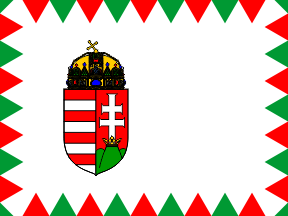 3:4
3:4
image by Željko Heimer, 15 Sepember 2014
3)  31:40
31:40
image by Željko Heimer, 15 Sepember 2014
I recently received some material, thanks to Armand, relating
Hungarian military flags. "Honvéd Zászló" means Army
Flag. As it would be seen from there, the Hungarian army still
(or again) uses flags of similar pattern. The details of the
border certainly have been changed from time to time, and if I
understood the matters properly, even today they are not quite
uniform. The device in the middle has been even more drastically
changed through time and space.
variant (1) is used by larger ships, (2) by smaller and (3) by
commanding speed boats.
Adopted: 12 April 1996. Ratio: (1) 4:5 (80X100 cm.), (2) 3:4
(60X80 cm.), (3) 31:40 (31X40 cm.)
Željko Heimer, 15 March 1999
Concerning the image at L'Album 2000 [pay00] (Fig 2. naval ensign):
According to my data the ensign is used (prescribed) in ratio
3:4, 4:5 and 31:40 (the last one is not mentioned). Also, the
leaves around the coat of arms is not (specifically) mentioned, though it
may be that it is implied when it is stated that the coat of arms is set
there. The shape of the corner pieces are not clearly described
in the source.
Željko Heimer, 5 January 2001
It was made according to a photo and also according to the law
on military flags in Magyar.
Armand Noel du Payrat, 12 January 2001
According to Album 2000 [pay00]
- Naval Ensign. (---/--W 3:4, 31:40 and 4:5) - White flag with coat of arms with olive and oak branches set along 1/3 and with red-green
flammulets along borders. As is known, this flag gets in three
sizes.
Željko Heimer, 2 November 2001
Regarding the Hungarian war ensign used on military vessels, there are no
leaves around the coat of arms. The regulation describes war ensign to be
hoisted on the vessels of the Hungarian Army (mainly on river Danube). Hungary
does not have any navy, but there is a small vessel unit as a part of the
Defense Forces.
It is a white ensign with red and green wolf-teeth along the edges, with green
cornerpieces (triangles), and with the coat of arms placed in the vertical axis
at one-third of ensign length near to the hoist. Dimensions are: 80 x 100 cm,
for smaller vessels 60 x 80 cm and for commanding boats 31 x 40 cm. (The
regulation about military symbols does not mention any wreath, only in case of
war flag used on land.) The ensign has 7 wolf-teeth in vertical edge and 9 in
horizontal edge.
There are some images of real war ensign:
http://taboroztatas.hu/img/HTHZ-Hadilobog%C3%B3%20a%20Bodrog%20felett.JPG
http://img.index.hu/imgfrm/0/3/4/4/THM_0004310344.jpg at this page (with
some vessels):
forum.index.hu
Zoltan Horvath, 14 January 2011
The wide white sleeve is NOT part of the design. It is only a technical
solution for small size ensigns.
Zoltan Horvath, 15 January 2011
Anyway, the three prescribed ensigns (for larger vessels, for "normal"
vessels and for speed motor boats) different in overall proportions, and this is
an issue regarding the design, which seems to be solved by Hungarians simply by
making some "free space" between the corner elements and the horizontal row of
triangles.
Here are photos of some actual ensign in use:
Image1
image 2
image 3
image 4.
Željko Heimer, 15 Sepember 2014
It has three different sizes for
various types of vessels (by the law), but only two of them are used (Image 1
and Image 2). They don't have any copy of the smallest version, they
used only 60X80 cm version on commanding boats as well.
Zoltan Horvath, 04 October 2014
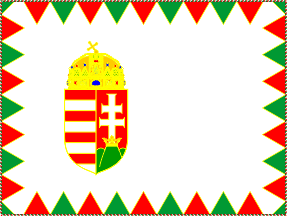
image by Željko Heimer, 15 Sepember 2014
Beside these "simple" ensigns, there seems to be in use some kind of
"ceremonial" ensigns: although I am very reluctant to call them so - it is
probably just a matter of manufacture, and they would have, probably, no any
other significance then the "simple" e.g. silk-screen printed ensigns. They are
produced by sawing pices of fabric together, where the seam is made of golden
thread, making them look indeed "ceremonial" (and similar to military
colours), and also there is tricolour cord around the flag edges. It may even be
that such treatment make the flags more durable (although probably more
expensive to make). At least two of above photos show such flags (the normal and
small size, it appears), but for the time being, I made only one image.
Željko Heimer, 15 Sepember 2014
There is no embriodery or national-coloured edge around these ensings, and
even there is no gap between the triangles in the corners. (If you can see any
of them, it's a mistake of the manufacturer.)
Zoltan Horvath, 04 October 2014
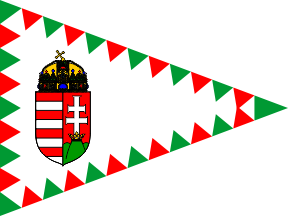
image by Željko Heimer, 15 Sepember 2014
Concering the image at L'Album 2000 [pay00] (Fig 6. Seniority pennant):
There is not mention of the leaves around the shield, and the
shape of corner peieces is unclear. Also, I don't remember seing
anything defining the "wolf-teeth" along the outer
edges not to be equilateral triangles.
Željko Heimer, 5 January 2001
The law states :"without tenants of branches.." ,
and the shape of corner pieces is unclear. the law states
:"half-corners, green".
Armand Noel du Payrat, 12 January 2001
The commission pennant and the ministerial flag need no updates, I guess, but
the senior officer's pennant does so very much. Although I haven't
found a photo of it, the
Wikipedia seems to be closer to what it might actually look like.
Anyway, although these may still not be 100% correct regarding the
edge and cornerpieces, they must be way better then my 2001 gifs we
still display. I would be glad if we could make them even better
eventually, but in the mean time, they should serve.
Željko Heimer, 15 Sepember 2014
Your image is perfect (image). I have only one comment. I prefer when you used HUN CoA
version of your 2001 renditions, because it seems to be more black-contoured
crown on recently posted ensings than previous ones.
This pennant is used when a commander stays on aboard of a vessel who has higher
rank than its original commander (except the Minister of Defense, who has an own
pennant).
Zoltan Horvath, 04 October 2014

image by Željko Heimer, 2 November 2001
Adopted 12 April 1996. Ratio: 21:200 (21X200 cm.)
Željko Heimer, 24 March 1998
Concering the image at L'Album 2000 [pay00] (Fig. 8. War pennant): I
think (at least that's how I interpret it) that the tricolour is
not "diminishing" towards the fly, but that the stripes
are perpendicular to hoist (so that the fly end is white only). I
may be wrong here, also. prescribed ratio for the pennant is
21:200.
Željko Heimer, 5 January 2001
According to Album 2000 [pay00]
- Masthead Pennant - Red-white-green triangular long pennant,
prescribed in size as 21 cm x 200 cm.
Željko Heimer, 2 November 2001
I received two pictures (Image 1
and Image 2) of two different versions. The first one seems to be the
official version what is directed by law, it is long and narrow, but the other
variant is shorter and only its end becomes narrower. It is used for smaller
vessels.
Zoltan Horvath, 04 October 2014

image by Zoltan Horvath, 29 April 2012
The Hungarian Defence Forces (HDF) has a flag, it is widely used, but there
is no any official legislation (at least I have not found yet). Its flag is
white with HDF logo in the center of the flag. Inscription means: For Homeland
(above) and Hungarian name of HDF: Magyar Honvédség. The emblem is a yellow
eagle grasping a sword, with oak laurel and Hungarian national coloured shield.
This flag is not replaced the so called military units' flag or war flag of
Hungary. It is used as an organizational flag of HDF.
More information about HDF (in English):
http://en.wikipedia.org/wiki/Military_of_Hungary
Image of flag:
http://www.hsz.hu/rovatok/akt/kereset0420/DSC_0027.jpg at:
http://www.hsz.hu/rovatok/akt/kereset0420/
Zoltan Horvath, 29 April 2012

image by Zoltan Horvath, 2 March 2010
Joint Forces Command of Hungarian Defense Forces (HDF JFC) was
established in 2007, as the legal successor of the Land Force
Command and the Air Force Command abolished, and taking over
certain tasks of the Joint Forces Logistics and Support Command,
the Signal and Informatics Command of the Hungarian Defence
Forces, the Operation Command Headquarters, and that of the
Medical Command of the Hungarian Defence Forces (these latter
were also abolished). HDF JFC is a medium level command &
control military organisation with an independent staff table and
a legal status of higher operational unit. The founder of HDF JFC
is the Minister of Defence, its supervisory body is the Ministry
of Defence. HDF JFC operates under the direct subordination of
the Chief of Defense Staff.
Joint Forces Command is located in Székesfehérvár. It
supervises 21 military units including all combat forces (land
and air forces) and some logistics units.
More information (in English) at <www.hm.gov.hu>.
Its flag is white with its circular emblem in the middle of the
flag. Elements of emblem are royal orb on a red and white striped
shield (symbol of the city), eagle and swords (representing
military forces). Inscription is Hungarian name of the Command
and its location city. Proportions of flag are 2:3.
Zoltan Horvath, 2 March 2010
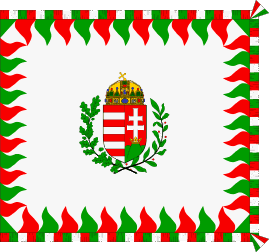
image by Željko Heimer, 3 November 2001
Adopted: 12-APR-1996. Ratio: 6:7 (120x140 cm)
Use: military units of level of a brigade, regiment, detached
battalion (group), Military River Fleet and others.
Željko Heimer
Here is a photo of Hungarian
Military Unit Flag.
Istvan Molnar, 6 September 2001
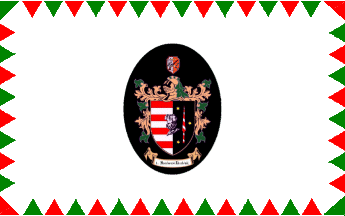
reverse side
image by Istvan Molnar, 21 October 2001
The symbol and the flag of the "Magyar Honvédség 5.
Bocskai István Gépesített Lövészdandár 1. Harckocsi
Zászlóalj" ("Hungarian Army 5th Bocskai István
Motorized Rifleman's Brigade 1st Tank Battalion"). The flag
was given by the Pro Patria Foundation of Debrecen City. One side
of the flag is blue on the center there is the coat of arms of Debrecen,
the other side is the military unit flag with the unit emblem.
Photos can be seen at here,
here
and here
(with the unit emblem). Bigger emblem can be seen here.
Istvan Molnar, 4 August 2001
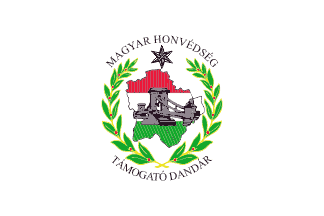
image by Zoltan Horvath, 29 April 2012
The HDF Supporting Brigade (MH Támogató Dandár) is a military unit directly
subordinated to Chief of Defence Staff. Its mission is to provide logistic,
communication, and ceremonial, etc. support for all military units and
institutions in Budapest.
Its flag is white with its logo in the middle of the flag. Its emblem is a
Budapest map coloured with national colours and charged with Chain Bridge. It is
surrounded by a green laurel, name of the brigade is written above and under the
emblem. One six-pointed star means that this unit is commanded by a one-star
general.
Image of flag:
http://www.honvedelem.hu/container/gallery/01_1324058535.jpg (on right side)
Zoltan Horvath, 29 April 2012